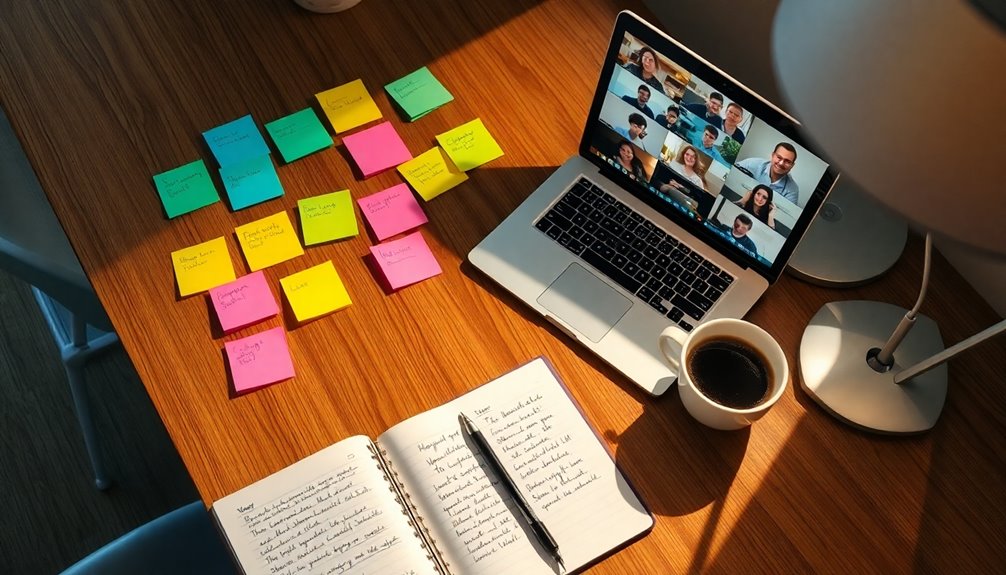Gaining access to interview assessments involves understanding their purpose and the various types used by employers. These assessments evaluate your skills, personality, and problem-solving abilities, ensuring you fit the company culture. Familiarity with question formats, like multiple-choice or situational judgment questions, will prepare you better. Staying calm and asking for clarification can enhance your answers during the assessment. Engaging follow-up questions showcase your interest and reinforce your qualifications. By mastering these insights, you'll not only improve your performance but also leave a lasting impression. There's a wealth of knowledge ahead to further sharpen your interview skills.
Key Takeaways
- Interview assessments are essential tools for employers to evaluate candidates' skills and ensure alignment with workplace values.
- Different types of assessments, like aptitude and personality tests, target specific areas of expertise for effective candidate evaluation.
- Popular question formats, including multiple choice and short-answer questions, help gauge a candidate's knowledge and understanding.
- Staying calm and engaging with interviewers can enhance response quality and demonstrate genuine interest in the position.
- Follow-up engagement, such as asking thoughtful questions, can positively influence a candidate's impression and candidacy outcome.
Understanding Interview Assessments

When you think about interview assessments, envision them as a strategic tool that helps employers gauge your skills and fit for a role.
These assessments serve as pre-interview screenings, allowing companies to gather relevant information about your characteristics and career goals. They're particularly vital for larger organizations, aligning candidates with workplace values.
Various interview questions target different areas of expertise, helping hiring managers identify the best candidates. Aptitude tests measure your potential for growth, while personality tests evaluate how well you'll mesh with the company culture.
Cognitive ability tests assess your relevant knowledge, and skills assessments focus on specific job-related abilities.
Ultimately, interview assessments streamline the hiring process, ensuring a better match for both you and the employer.
Types of Assessments Explained

Understanding the different types of interview assessments can greatly enhance your preparation for job applications. Each type serves a unique purpose, helping employers gauge your fit for the role.
Aptitude tests measure your potential and problem-solving skills, while personality tests assess how well you align with the company culture. Cognitive ability tests evaluate your relevant knowledge and qualifications.
Skills assessments focus on specific abilities required for tasks, allowing employers to see you in action. Situational judgment tests present hypothetical scenarios, testing your decision-making skills.
Popular Question Formats

Interview questions come in various formats, each designed to elicit different responses and insights about candidates. True-or-false and agree-or-disagree questions help evaluate factual accuracy and alignment with concepts.
Multiple choice questions test your knowledge of job duties, while matching questions require you to connect questions to corresponding answers. Short-answer questions prompt concise responses, showcasing your in-depth understanding.
Essay questions allow you to express your viewpoints in detail. Story-based questions present scenarios to assess your industry knowledge and problem-solving skills.
Verbal questions explore your personality traits and communication abilities, while computational and image questions gauge logical reasoning and visual processing.
Each format serves a specific purpose in evaluating your fit for the role.
Strategies for Handling Questions

Five effective strategies can help you handle questions with confidence during an interview. First, stay calm and take a deep breath if you're caught off guard. Second, don't hesitate to ask for clarification if a question seems unclear. Third, it's perfectly fine to repeat the question to gather your thoughts. Fourth, engage with the interviewer by showing genuine interest in their queries. Finally, practice makes perfect—rehearse common questions beforehand.
Here's a quick reference table to summarize:
| Strategy | Purpose | Example |
|---|---|---|
| Stay Calm | Manage anxiety | Deep breathing |
| Ask for Clarification | Gain understanding | "Could you elaborate on that?" |
| Repeat the Question | Gather thoughts | "So, you're asking about…?" |
Using these strategies, you can navigate questions with ease.
Techniques for Effective Pausing

Effective pausing during an interview can greatly enhance your responses, allowing you to gather your thoughts and deliver well-considered answers.
To make the most of pauses, try asking for clarification if a question isn't clear. This not only buys you time but also shows your engagement.
Repeating the question can help you frame your response while giving you a moment to think. Don't hesitate to request a moment to collect your thoughts if you need it.
Additionally, showcase your interest by asking follow-up questions, which can also create natural pauses in conversation.
Sharing Knowledge During Interviews

When you share your knowledge during an interview, it's crucial to speak up rather than stay silent. Providing relevant information showcases your expertise and demonstrates your fit for the role.
Focus on highlighting your accomplishments and how they align with the company's goals. Use specific examples to illustrate your points, as this adds weight to your claims.
Don't hesitate to discuss metrics or outcomes that reflect your contributions; these details can make a lasting impression. Remember, interviewers appreciate confidence, so articulate your thoughts clearly.
Even if you lack complete information, expressing what you know can still underline your value. Engaging in this way not only informs the interviewer but also establishes a connection that can benefit your candidacy.
Utilizing Hypothetical Scenarios

Utilizing hypothetical scenarios in an interview can greatly enhance your ability to demonstrate problem-solving skills and critical thinking. When you encounter these scenarios, it's your chance to showcase how you approach challenges.
Here are some key points to reflect on:
- Think Aloud: Share your thought process as you work through the scenario.
- Be Structured: Organize your answer logically to highlight your analytical skills.
- Relate to Experience: Draw parallels to past situations to show relevance.
- Stay Positive: Focus on potential solutions rather than obstacles.
- Additionally, showcasing strong communication skills can further impress employers and set you apart from other candidates.
Importance of Follow-Up Engagement

Follow-up engagement after answering interview questions is essential for leaving a lasting impression on your interviewer. It shows your commitment to the conversation and highlights your enthusiasm for the role.
After responding, take a moment to clarify or expand on key points that may have been overlooked. This not only reinforces your qualifications but also demonstrates your proactive nature.
Additionally, asking thoughtful questions about the company or role can deepen the dialogue and help build rapport.
Frequently Asked Questions
How Can I Prepare for an Interview Assessment?
To prepare for an interview assessment, start by researching the company and its values.
Familiarize yourself with common assessment types like aptitude and personality tests.
Practice answering different question formats, such as multiple choice and essay questions.
Simulate interview scenarios with a friend to build confidence.
Don't forget to clarify or take a moment to think when faced with unexpected questions.
Finally, reflect on your responses to improve for future assessments.
What Common Mistakes Should Candidates Avoid During Assessments?
During assessments, you should avoid several common mistakes. First, don't rush your answers; take your time to think things through.
Not asking for clarification when confused can lead to misunderstandings. Also, steer clear of overconfidence; it's better to show humility and openness to feedback.
Finally, neglecting to follow up on your answers might leave key points unaddressed. Remember, showcasing your thought process and engagement can make a strong impression.
How Do Interview Assessments Impact Hiring Decisions?
Interview assessments greatly impact hiring decisions by providing a structured way to evaluate candidates' skills and compatibility with the company's culture.
They help you showcase your abilities, allowing hiring managers to identify the best fit for the role. By taking various assessments, you demonstrate your strengths and how you align with the organization's values, ultimately influencing the hiring outcome in your favor.
Your performance in these assessments can set you apart from other candidates.
Can Interview Assessments Be Tailored to Specific Roles?
Imagine walking into an interview, feeling the tension in the air. You wonder, can interview assessments actually be tailored to specific roles?
Absolutely! Companies can design assessments focusing on the unique skills and traits needed for different positions.
Whether it's a skills test for a tech job or a personality test for a customer service role, customizing assessments guarantees candidates align with the job requirements, enhancing the hiring process and increasing success rates.
What Resources Are Available for Practicing Interview Assessments?
When you're looking to practice interview assessments, various resources can help.
Online platforms offer sample tests, quizzes, and interactive exercises tailored to specific skills. Books focused on interview techniques often include practice questions, while local workshops provide hands-on experience.
You can also join study groups or forums to exchange tips and mock interviews with peers. Utilizing these resources will boost your confidence and prepare you effectively for any assessment you face.
Conclusion
By mastering interview assessments, you're not just filling positions; you're building a future. Think of it as crafting a winning team, like assembling the Avengers—each member brings unique strengths to the table. When you embrace these strategies, you'll discover top talent that aligns with your vision and values. So, immerse yourself in the process, trust your instincts, and watch your organization flourish. After all, the right hires today can shape the legends of tomorrow.









